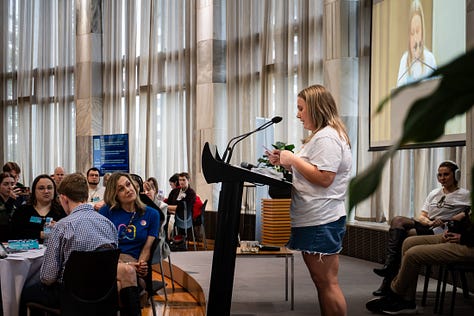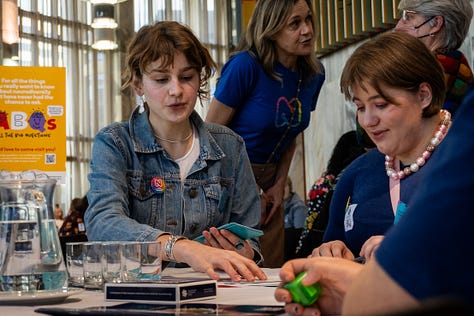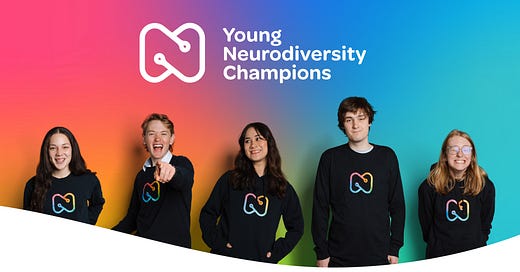The untapped potential of neurodiversity- The Young Neurodiversity Champions call for action at a Parliament Hui
Angelina interviews Kartini Clarke, CEO of Young Neurodiversity Champions
The traditional classroom setting does not accommodate every student’s individual needs. Alongside struggling in a standardised system, rangatahi may also face discrimination and stigma surrounding their own capabilities and behaviours in the classroom. But, if this stigma were tackled with compassion, these students could simply be viewed as ‘’different’’ rather than ‘’incapable’’.
The term neurodiversity encompasses the differences in individual brains on a spectrum of traits, behaviours, and disorders. While this diversity exists across the multitude of brains on Earth, many neurodivergent people in Aotearoa do not get the help they need to blossom to their full neurological potential.



Kartini Clarke, past political candidate of the ACT party and CEO of the Young Neurodiversity Champions, struggled in the school system. Her experiences led her to tackle the issue of creating a more neuro-inclusive future for students because she didn’t want ‘’another kid to feel as bad as [she] did growing up.’’ She expresses that she wants ‘’no student to be left behind because the school system has traumatised them to the point where they don't believe they are enough.‘’
A group of neurodivergent rangatahi lead The Young Neurodiversity Champions, and are mentored and coached through the Neurodiversity in Education project. They have a kaupapa of supporting students, empowering educators, and advocating for change. With ‘Champions’ based all over Aotearoa, YNC hosts workshops and events and participates in political action. The Champions come to schools to educate students about neurodiversity, and empower them to spot traits within themselves.
Justine Munro, CEO of the Neurodiversity in Education Project, outlined the programmes through which the Champions train teachers and believes that ‘’young people have a huge role to play in upskilling.’’
‘’Most of our teachers were educated at a time when we didn't know about the neuroscience of our brains. We didn't know that every human being has a brain that works differently. We now do, but our education system for teachers has not kept up with that.”
The spaces within schools have also not kept up with this. The ways in which classrooms are set up, with the effects of noises, sensory factors, and what is needed for the individual are essential considerations. Justine believes that the lack of resources for neurodiversity, especially surrounding diagnoses, can also be dealt with through training, where teachers can spot characteristics and respond to them appropriately. Without the necessary support, rangatahi can experience disengagement from education, unemployment, poor mental health and more.



As a satellite event to the Festival for the Future, the Young Neurodiversity Champions hosted a Neurodiversity Hui at parliament. The youth-led group called for a Ministerial Advisory Group on Neurodiversity within the government, wherein decisions surrounding mental health, education and health would be guided by neurodiverse youth.
The initiatives of the YNC beyond a classroom setting were highlighted by Kartini. ‘’Neurodiversity encompasses our health, physical health and learning support ‘’. In addition to this, they are seeking government funding support. As one of the Champions, Kartini believes that government approaches to neurodiversity support have directed focus in the wrong places. “I don't think they're focusing on the entire education system as a whole. They believe that the solution is learning support when it's so much bigger than that. Some of us are academically inclined and believe that we won't be supported by learning support.” Maria, one of the Champions, was not extended enough in school, and it took years for her to be pushed up a few grades. The Champions are devoted to ‘’focusing on strengths rather than deficits when it comes to our differences of brains’’ and aim to ‘’show that all brains fit into society.’’ ‘’We all have different strengths and without them we might not have all the innovations that we currently have.”
Kartini underlined the ‘political football’ that has played out surrounding issues of Neurodiversity support. The need for an intersectional approach towards tackling these issues was highlighted by MP Lawrence Xu-Nan on a panel at the parliament hui. ‘’We heard of neurodiversity and women but also neurodiversity and ethnicity. I am probably the first Chinese MP with ADHD.’’ Leaders with first-hand experience need to be at the forefront of government action. Pōneke Mayor Tory Whanau, made her ADHD diagnosis public this year, and similarly expressed that ‘’we need people like this to look after the people.”
On a panel on ‘’Identity and Belonging’’ at Festival for the Future, Kartini discussed her experience as a Pākehā-Indonesian student with ADHD. She highlighted the importance of focusing on an individual’s brain in the context of unique backgrounds and experiences. Kartini’s upbringing challenged her with the stigmatisation of mental health in Asian cultures. “I was often told I was just putting on an act” says Kartini. “I was not mentally ill because I should be in an asylum.” This took a massive toll on her sense of identity, because she knew there was a part of herself that she had not yet connected with. Kartini expresses that she had “significant mental health issues growing up” and “suffered from depression and anxiety.” It was only after she had graduated school and was in the middle of her political campaign that she was diagnosed with complex post-traumatic stress disorder, but she knew that there was something else. “The missing piece that I picked up was ADHD and everything clicked. And then a year later it was, I might be autistic.”
After her diagnosis, Kartini thrived, picking up a degree in law, despite the doubts of her teachers that she would succeed. Once she had gained an understanding of mental health and neurodiversity within herself, she took on the task of communicating this to her family. Kartini says that her family is “now on their journey of self-discovery too,” and noted that they are“becoming really accepting of themselves and their behaviours.” The intersectionality of Kartini’s cultural background, her mental health issues and her neurodiversity saw the need for a uniquely tailored path towards radical acceptance of self. Kartini feels that this journey has “healed the family unit,” and has enabled her to create the support structure she needs to flourish.

Neurodiverse inclusion can be a complex, case-by-case process. But, a healthy, future-driven society compassionately recognizes these differences, no matter how misunderstood, no matter how foreign, and works hard to uplift them. A flower once stomped upon may still have seeds, and with seeds, there is the potential to grow a fully fledged, fruitful plant.







